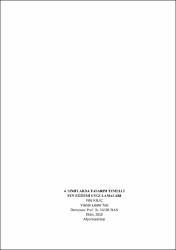4. Sınıflarda tasarım temelli fen eğitimi uygulamaları
Abstract
Günümüzde ülkeler arasında sürdürülen teknoloji ve mühendislik çalışmalarında üretim olarak geride kalmamak için eğitimde yaşam becerilerinin kazandırılmasına önem verilmektedir. Öğrencilere yaşam becerilerini kazandırma ve bu becerileri günlük yaşama adapte etme isteği tasarım temelli fen eğitimi uygulamalarına önem katmaktadır. Bu çalışmada, tasarım temelli fen eğitimi (TTFE) uygulamalarının öğrencilerin temel becerileri, bilime yönelik tutumları ve bilimsel yaratıcılık becerileri üzerine etkisini belirlemek amaçlanmıştır. Araştırma, 2017-2018 eğitim-öğretim yılında Mahir Özgür Damar İlkokulu’nun 4. sınıflarında gerçekleştirilmiştir. Araştırmada “Bilime Yönelik Tutum Ölçeği”, “Bilimsel Yaratıcılık Ölçeği” ve “Temel Beceriler Ölçeği’’ kullanılmıştır. Veriler bilgisayar ortamında istatistik paket programıyla değerlendirilmiştir. Çalışmada nicel araştırma yöntemlerinden yarı-deneysel desenin bir türü olan ön test-son test kontrol gruplu model kullanılmıştır.
Beş haftalık uygulama süreci, 4. sınıf “Basit Elektrik Devreleri”, “Kuvvetin Etkileri” ve “Uygulamalı Bilim” ünitesini kapsamaktadır. Araştırmada tasarım temelli fen eğitimi uygulamalarının öğrencilerin bilime yönelik tutumları üzerinde anlamlı etkisi görülmezken, bilimsel yaratıcılık becerisi ve temel becerileri üzerinde anlamlı olumlu yönde etkisi olduğu görülmüştür. 4. sınıf öğrencilerinin, bilime yönelik tutumlarını olumlu yönde geliştirmek, temel becerileri ve bilimsel yaratıcılık becerilerinde gelişim sağlamak için, günlük yaşamda karşılaşacakları problemleri çözmeye fırsat tanıyan etkinlikler ders içinde arttırılabilir. 4. sınıf öğrencileri için söz konusu öğrenme ortamı sağlanması ile ilgili olanak ve problem durumları oluşturulabilir. Araştırma sonuçlarında gözlenen değişkenler arasındaki farklı durumların sebeplerini araştıran yönde çalışmalar yapılabilir. In today's technology and engineering studies carried out among countries, importance is given to gaining life skills in education in order not to be left behind as production. The desire of students to acquire life skills and adapt them to daily life adds importance to design-based science education practices.
In this study, it is aimed to determine the effect of design-based science education (DBSE) applications on students' basic skills, attitudes towards science and creative thinking skills. The research was conducted in the 4th grade of Mahir Özgür Damar Primary School in 2017-2018 academic year. “Attitude Scale towards Science”, “Creative Thinking Scale” and “Basic Skills Scale’ were used in the study. The data were evaluated with statistical package program on computer. In this study, pre-test and post-test control group model, which is a kind of quasi-experimental design, is used. The five-week implementation process includes the 4th grade “Simple Electrical Circuits”, “Effects of Force” and “Applied Science”. In the study, while design-based science education practices did not have a significant effect on students' attitudes towards science, it was found that there was a significant positive effect on creative thinking and basic skills. In order to improve the attitudes of 4th graders towards science, to develop basic skills and creative thinking skills, activities that provide opportunity to solve problems in daily life can be increased in the course. Possibilities and problems related to the provision of the said learning environment can be created for 4th grade students. Studies can be conducted to investigate the causes of different situations among the observed variables in the research results.
Collections
- Yüksek Lisans Tezleri [1638]



















